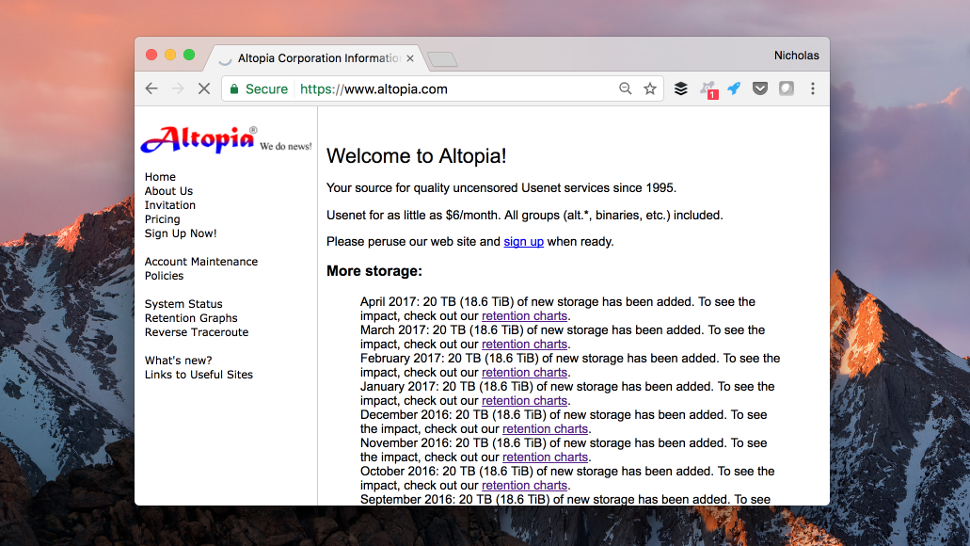TechRadar Verdict
Altopia may not be the most powerful Usenet service, but it certainly has a lot of experience, and offers unlimited speeds and data on even the cheapest plan.
Pros
- +
Unlimited speeds and usage for all plans
- +
Base subscription is temptingly priced
Cons
- -
Retention rate is low
- -
Not user-friendly
Why you can trust TechRadar
Usenet services have been around for decades, and Altopia is among the oldest on the market. The company was set up in 1995 by a university system admin who wanted to create a useful, uncensored newsgroup service for students.
Since then, it’s gone on to become a commercial service for different industries. While it may not be as big or sophisticated as other platforms out there, the firm puts ethics first. It aims to promote freedom of expression so that customers can make their thoughts known, and it protects customer privacy (while cooperating with law enforcement agencies and copyright holders).
Altopia, as a platform, is powered by open source software such as Linux, Apache, PostgreSQL, BIRD and Keepalived, and it has made a pledge to contribute code back to the community. More than anything, it’s a service that puts old-school technologists and companies first.
Performance
As we always stress in our Usenet reviews, retention is an important consideration when it comes to picking the right service. Compared to other providers, Altopia offers a significantly lower retention rate. For text articles and single-part binaries, there are only 550 days of retention. Multi-part binaries (two to fifteen parts) are at the same rate, while binaries consisting of 15 parts or more disappear after a mere 14 days.
Going for an insecure Usenet service would be a bad decision, obviously, but fortunately, Altopia puts customer security and privacy at the forefront. The company gives all users SSL encryption like many other providers on the market, requiring TLS 1.0 or better (and noting that SSL 3.0 and SSL 2.0 are considered insecure, although port 666 can be used if you want to go the SSL 3.0 route).
Speed and UI
Altopia offers a completely unthrottled service. There aren’t any speed limits or caps on downloads, meaning you can max out your connection. As well as this, you can link the platform up to other newsreader services for greater flexibility.
Unfortunately, when it comes to the user interface, Altopia does look somewhat outdated. There’s no sophisticated browser app here, and instead you need a degree of tech knowledge to operate the platform. That’s not to say it’s overly difficult, but it’s fiddly, to say the least.
Sign up to the TechRadar Pro newsletter to get all the top news, opinion, features and guidance your business needs to succeed!
Customer service and pricing
As is the case with rivals like Newsgroupdirect, you can receive incentives if you get other people to sign up to Altopia. All they have to do is purchase an account and mention your email address or ID. You’ll then receive a free month of service, and multiple free months can be obtained if you’re particularly diligent in recruiting.
Another great thing about the platform is that it offers a risk-free guarantee to customers. If you feel like you’re not satisfied with the service after the first two weeks, you can email support@altopia.com to request a full refund. There’s a limit of one refund per customer per year to stop attempts at cheating the system.
All of the company’s price plans operate on a monthly basis, and as previously mentioned, SSL encryption is offered free to every user. The cheapest option costs $6 (£4.70) a month, giving you unlimited speed and usage, with two connections. Plans differ based on the amount of connections you need, with the most expensive plan running to $18 (£14) a month. With that particular subscription, you get 20 connections.
Final verdict
There’s no denying the fact that there are more powerful, more user-friendly newsgroup services out there. But at the same time, Altopia isn’t trying to compete with them directly. Instead, it’s an old-school Usenet provider aimed at people who have the knowledge and skills to get the most out of a traditional newsgroup service.
Nicholas Fearn is a freelance technology journalist and copywriter from the Welsh valleys. His work has appeared in publications such as the FT, the Independent, the Daily Telegraph, The Next Web, T3, Android Central, Computer Weekly, and many others. He also happens to be a diehard Mariah Carey fan!
